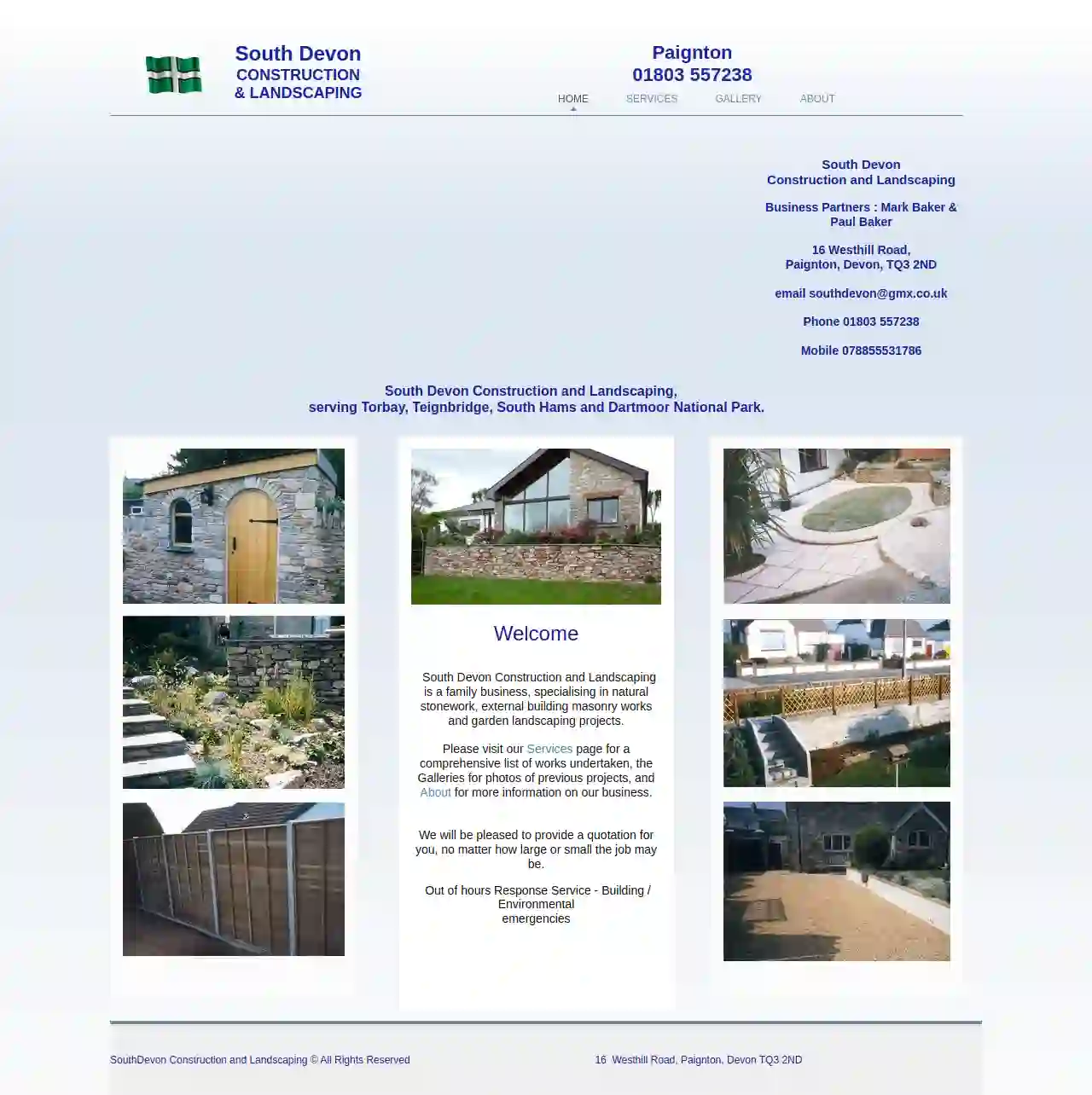Excavation Contractors Preston
Top Excavation Contractors in Preston
Get up to 3 Excavation Companies quotes for your project today! Compare profiles, reviews, accreditations, portfolio, etc... and choose the best deal.
- MJ
MJ Drains Ltd
4.726 reviewsPreston, GB- Services
- Why Us?
Get Quote 
South Devon Construction & Landscaping
52 reviews16 Westhill Road, Paignton, Devon, TQ3 2ND, GBAbout South Devon Construction & Landscaping South Devon Construction & Landscaping is a family business run by brothers Mark & Paul Baker. They took over the business from their father - David, who retired in 1998. David was an accomplished Builder & Stonemason who was employed by local builders during the 1950's, before setting up in business in 1960. Both Mark & Paul started working for David in the early 1990's. Mark having served his apprenticeship in the mid 1980's with Torbay Council. He studied Landscaping and Horticulture at Bicton College. Paul served his apprenticeship in the early / mid 1990's while working in the business. He studied Construction at South Devon College. South Devon Construction & Landscaping is a small family business, and are currently just below the turnover threshold for value added tax. Therefore there is no VAT added to their quotations. The business is fully insured with Public liability cover to £ 2,000,000 indemnity and Employer's liability to £ 10,000,000 indemnity. They also have an Environment Agency license for the conveyance and disposal of waste. The business operates an 'Out of hours' - response service for Building or Environmental emergencies. They are equipped with a large supply of roadsigns, cones, barrier boards, etc. for making areas safe.
- Services
- Why Us?
- Our Team
- Gallery
Get Quote- To
Torbay Digger Services
54 reviewsPreston, GB- Services
- Why Us?
Get Quote - Ex
Exjet Services
4.649 reviewsPreston, GB- Services
- Why Us?
Get Quote
Over 11,537+ Excavation Contractors registered
Our excavation companies operate in Preston & surroundings!
ExcavationHQ has curated and vetted the Best Excavation Companies in and around Preston. Find a trustworthy business today.
Frequently Asked Questions About Excavation Contractors
- Project Size and Scope: Larger, more complex excavations naturally take longer.
- Soil Conditions: Rocky or challenging soil types can slow down progress.
- Site Accessibility: Limited access might require more time for maneuvering equipment and hauling materials.
- Weather: Inclement weather can cause delays.
- Permitting and Inspections: Waiting for permits or inspections can extend the timeline.
- Clearly Define the Scope: Outline the project's goals, including the excavation area, depth, grade, and intended use.
- Obtain Necessary Permits: Research and acquire any required permits from your local authorities.
- Mark Utility Lines: Contact your utility companies to locate and mark underground utilities to prevent damage.
- Communicate with Neighbors: Inform your neighbors about the project's timeline and potential noise or disruptions.
- Prepare the Site: Clear any obstacles, such as vegetation, furniture, or structures, from the excavation area.
- Discuss Safety Protocols: Review safety procedures with the contractor to ensure a safe work environment.
How long does an excavation project take?
What is the difference between cut and fill excavation?
Cut: Involves excavating soil from an area where the existing grade is higher than the desired grade.
Fill: Refers to using the excavated soil ('cut' material) to raise the grade in an area where the existing grade is lower than desired.
This method minimizes the need to import or export soil, reducing costs and environmental impact. It's commonly used for site preparation, road construction, and landscaping.
What should I do before excavation starts?
What is the difference between topsoil and subsoil?
Topsoil: The uppermost layer, typically rich in organic matter, nutrients, and microorganisms. It's essential for plant growth and is often darker in color.
Subsoil: The layer beneath the topsoil, containing less organic matter and generally denser. It provides support for roots but is less fertile than topsoil.
During excavation, topsoil is often removed and preserved separately for later use in landscaping, while subsoil is typically used for backfilling or other less demanding applications.
How long does an excavation project take?
- Project Size and Scope: Larger, more complex excavations naturally take longer.
- Soil Conditions: Rocky or challenging soil types can slow down progress.
- Site Accessibility: Limited access might require more time for maneuvering equipment and hauling materials.
- Weather: Inclement weather can cause delays.
- Permitting and Inspections: Waiting for permits or inspections can extend the timeline.
What is the difference between cut and fill excavation?
Cut: Involves excavating soil from an area where the existing grade is higher than the desired grade.
Fill: Refers to using the excavated soil ('cut' material) to raise the grade in an area where the existing grade is lower than desired.
This method minimizes the need to import or export soil, reducing costs and environmental impact. It's commonly used for site preparation, road construction, and landscaping.
What should I do before excavation starts?
- Clearly Define the Scope: Outline the project's goals, including the excavation area, depth, grade, and intended use.
- Obtain Necessary Permits: Research and acquire any required permits from your local authorities.
- Mark Utility Lines: Contact your utility companies to locate and mark underground utilities to prevent damage.
- Communicate with Neighbors: Inform your neighbors about the project's timeline and potential noise or disruptions.
- Prepare the Site: Clear any obstacles, such as vegetation, furniture, or structures, from the excavation area.
- Discuss Safety Protocols: Review safety procedures with the contractor to ensure a safe work environment.
What is the difference between topsoil and subsoil?
Topsoil: The uppermost layer, typically rich in organic matter, nutrients, and microorganisms. It's essential for plant growth and is often darker in color.
Subsoil: The layer beneath the topsoil, containing less organic matter and generally denser. It provides support for roots but is less fertile than topsoil.
During excavation, topsoil is often removed and preserved separately for later use in landscaping, while subsoil is typically used for backfilling or other less demanding applications.